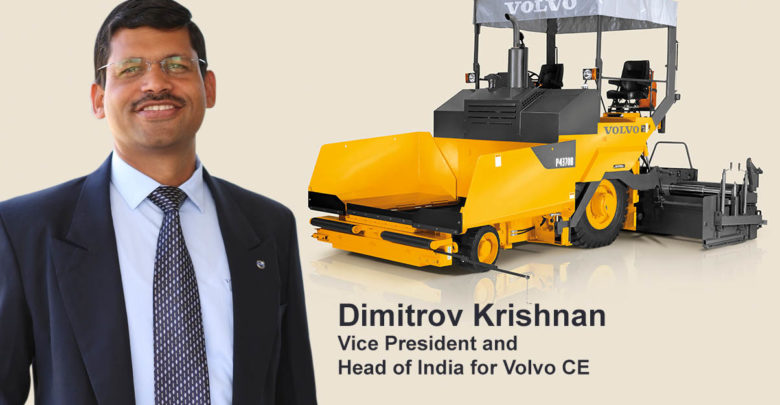Volvo’s efficient and precise sensor pavers to drive road building in India

The Indian government’s plans to increase road construction from its current level of about 23 km a day to an eventual 40 km a day have made road pavers, particularly sensor pavers, increasingly important for projects around the country. Equipped with intelligent operating technology, Volvo sensor pavers deliver superior paving quality and greater efficiency compared to regular pavers.
“The paving quality of any road is defined by the ability of the paver to satisfy three requirements in line with the highway design: mat thickness, level of the mat, and the grade required,” said Dimitrov Krishnan, Vice President and Head of India for Volvo CE.
“Regular pavers without sensors simply follow the undulations of the road base and are therefore unable to give a smooth finish to a paved surface. But sensor pavers have intelligent operating technology that helps the machine deliver on these three requirements.”
Two of the sensor paver models available in India are the P4370B ABG and the P5320B ABG, both made at Volvo’s plant in Bangalore. The P4370B ABG is a wheeled sensor paver powered by an 88 kW engine and it has a basic paving width of 2.5 m and maximum pavig width of 5.5m. It can deliver a paving output of 600 tons per hour. The P5320B ABG is a tracked sensor paver similarly powered by an 88 kW engine. This high power is delivered with minimal noise and low fuel consumption. The P5320B ABG also has a paving output of 600 tons per hour and again basic paving width of 2.5 m and maximum paving width of 7 m.
The P5320B ABG, Volvo’s latest product for the road building industry, also boasts innovations such as load-sensing hydraulics, so that hydraulic output is perfectly matched to all components. An automatic hydraulic track tensioner delivers smoother operation while simultaneously reducing wear and downtime. The Volvo Omni V screed provides variable width on the go. The electronically-ignited gas heating system, designed with flame failure protection, quickly and efficient heats the screed plate, while the LPG blower burner system provides uniform heat for a smooth mat finish, with quality pre-compaction.
“Generally speaking, there’s good understanding among road building contractors that innovative, efficient, and productive equipment is going to be essential if companies are to meet the ambitious road building targets set by the Indian government,” said Krishnan. “While there is still some hesitation from contractors because they are used to working with older, cheaper, and less productive machinery, once they understand how technology on modern equipment help reduce the machine’s overall lifetime costs, then I think we’ll begin to see an industry-wide adoption of sensor pavers.”
Volvo’s range of sensor pavers available in India also includes units built at the company’s German factory. The most popular is the P6820C ABG, which offers paving widths of 2.5 m to 9 m. Volvo Variomatic screeds provide customers with hydraulically-extending widths. The machine can also be configured with manual screeds. The P6820C is powered by a 142 kW engine and has a paving output of 700 tons per hour. Volvo expects a healthy and consistent demand for the P4370B ABG, the P5320B ABG, the P6820C ABG, and its range of other sensor pavers for the foreseeable future.
“The scale of the government’s road building programme is a huge factor. We are looking at not just highways but also rural development. Another factor is the speed of development. Contractors are under huge pressure to deliver major projects in relatively short spans of time,” said Krishnan. “As long as there is no significant alteration to the government’s approach, we expect the market for sensor pavers to remain strong for the next three to five years.”


